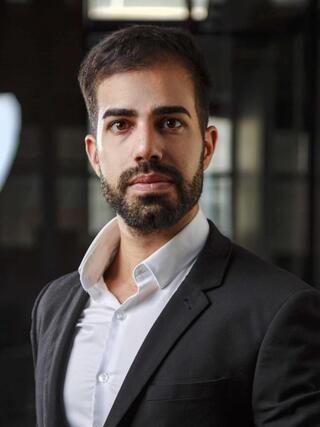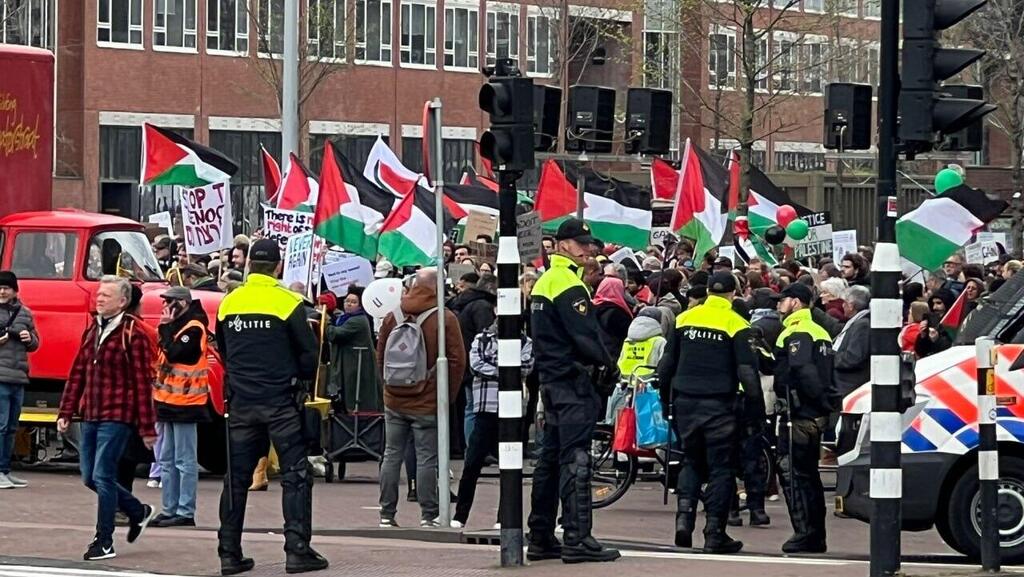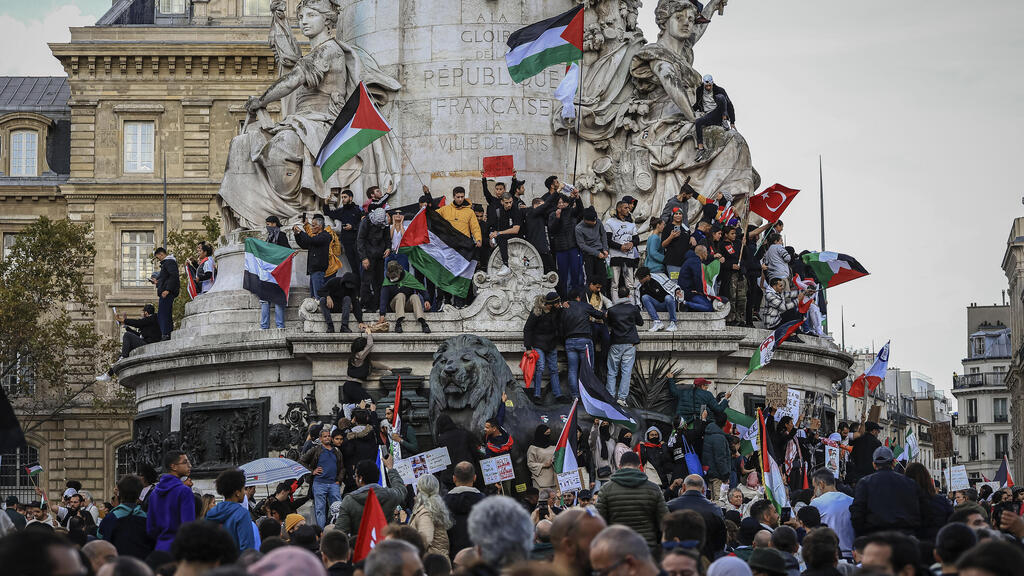Getting your Trinity Audio player ready...
The organized pogrom perpetrated against Maccabi Tel Aviv soccer fans, in which Jews were humiliated and assaulted on European soil, sounded alarm bells this week. It must be said, however, that these came on top of countless red flags indicating the growing radical Islamic threat germinating European soil.
Painful motifs, such as the timing of this pogrom just moments before the anniversary of Kristallnacht, the brutal violence, the hurling of Jews into canals in the city, or the blind eye turned by the authorities, made this event all the more outstanding and horrific. In view of the surge in antisemitism in Europe throughout the war and the increasing frequency of demonstrations and violent disturbances, one arrives at an unmistakable conclusion: These are no isolated incidents. Rather, this is a new, undeniable reality on European soil. In extreme scenarios, it could fundamentally alter Israeli-European diplomatic and defense relations.
Anti-Israel demonstrators arrested in Amsterdam's Dam Square
This new reality presents us with a clear picture: The classical continent, which is portrayed as a peaceful Western territory filled with picturesque villages, Gothic cathedrals, steam trains and iconic tourist attractions like the Eiffel Tower, the Schoenbrunn Palace and London Tower, is gradually undergoing a transformation. The change in the demographics and in the civilization itself in Europe has been taking form over the past decades and at an accelerated pace this past decade. Faced with this reality, Europe, for the most part, is helpless, slow to respond, and has yet to fully realize the magnitude of the threat that has entered into the belly of the beast.
Aided and abetted by the authorities, millions of immigrants from the Islamic world have been arriving, reshaping the continent with their feet. It is not uncommon nowadays to walk around Berlin, Brussels, Amsterdam, Paris, Barcelona or London and feel how these so closely-familiar cities, touted as tourism and culinary hotspots, are being enveloped with entire ghettos and filled with large immigrant communities that are tightening their grip on these places. Cultural artifacts like billboards in Arabic and mosque minarets are increasingly becoming a feature of everyday life. “We have become the Gaza of Europe,” lamented Dutch leader Geert Wilders bitterly. “I refuse to accept this.”
But the reality is that 30% of Birmingham’s population is Muslim, some half of Brussels’ is of non-Belgian descent, and the most commonly given name to newborn children is Muhammad. All of this dovetails with the reality in many other European cities, yet are met with a deep culture of denial among Europeans.
3 View gallery


Protestors ahead of Maccabi Tel Aviv-Ajax match in Amsterdam
(Photo: Jeroen Jumelet / ANP / AFP)
The last time demographic data on Islam’s prevalence in Europe was released was in 2016. For some reason, in the past eight years, there has been no release of updated figures. In a conference I attended, a senior European Union official voiced her surprise at the complaints voiced by the “radical right” regarding mass immigration into Europe.
She made comparisons to the massive presence of Venezuelan refugees throughout South America, or Syrian refugees in Jordan, Turkey and Lebanon - to the situation in Europe, which according to her was negligible. Another speaker, a senior NATO official, insisted - mistakenly - that the immigrants were not responsible for even a single terrorist attack in Europe. None other than French President Emmanuel Macron spoke about “séparatisme”, but stressed that the terrorist attacks are perpetrated by French people - not by immigrants - since they are French citizens, totally sidestepping the issue of the civilizational shift underway in his own backyard.
Incidents like the Amsterdam pogrom ought to shake even nationalistic governments out of their doldrums in reaction to these “Wir schaffen das”-type policies of former Chancellor Angela Merkel, but they are slow to react. Laws allowing for revocation of citizenship and deportation of inciters and terrorists are being hollowed out.
Thus, the extradition of the “Jihad Widow” in Brussels is being delayed for years as the legal wrangling drags on, and the Hamas-sympathizing agitator Muhammad Hanoun in Italy is still leading antisemitic demonstrations without his citizenship being revoked or him being deported - even though the US State Department has imposed sanctions against him. The government in Italy of Giorgia Meloni is still working on its Albania Plan without any tangible results, and even the newly installed right-wing governments in Austria and the Netherlands are slow in implementing an effective immigration policy.
Countries such as France or Switzerland prefer, on the one hand, to pass laws outlawing burkas or mosque minarets in the public sphere, while on the other hand allowing hundreds of thousands of immigrants to enter their countries and remain there permanently. The European Union’s 2020 counter-terrorism strategy included a pitiful few measures aimed at tightening border security or deportation of agitators. They included mainly measures for strengthening “community resilience” through sport, intelligence cooperation and removal of youths from the path toward radicalization through soft means.
Poland, Hungary and the Czech Republic are the only countries that refuse to go along with the family reunion policy and the pro-immigration policies of the rest of Europe, policies that have seen the admission of millions of immigrants into the continent with the world’s lowest average birth rate. The results are plain to see - an almost total absence of antisemitic incidents, even in view of the war in the Middle East, in stark contrast to the surge in such incidents throughout the rest of Europe.
The Amsterdam events are consistent with the European attitude toward the war in Israel. This begins with a profound denial of the root cause of the problem and the preference for “band-aid” solutions – in Israel’s case, Europe’s failure to call out Iran’s hegemonistic motives and Hamas’ and Hezbollah’s antisemitism, while focusing on the territorial dispute with the Palestinians and on the “two-state solution.”
In the case of Amsterdam, this means “severely punishing” the culprits or “strengthening security” – instead of addressing the broader threat from radical Islam. This is also the case when it comes to media coverage, and although for the most part, it reflected the reality on the ground, it did blow out of proportion isolated incidents perpetrated by “Jewish hooligans” who had rioted and were arrested, or that “Maccabi fans tore down Palestinian flags and provoked riots.”
This skewed view of reality is nothing new for Israelis in the context of the war here in the Middle East, where headlines decry the “massacre of civilians” or the “catastrophic famine” within the Strip.
Europe is still deep in denial. Around half of the teachers in France avoid discussing certain issues for fear of provoking Muslim students, particularly after the appalling murder of teacher Samuel Paty. The terrorist attacks in Paris, Barcelona and London, the assassinations of artists critical of Islam, as in the case of Dutch director Theo Van Gogh, or the attack against the Charlie Hebdo magazine in Paris, all these still meet a complacent European public, where only 32% of surveyed citizens are prepared to fight to defend their country. The rest of those surveyed are more worried about climate change than security issues.
The first signs of change in the European political landscape have begun to appear: right-wing governments, sometimes radical right-wing, are ascending to power. There is a marked drop in voting for Green parties in favor of nationalist parties, and many constraints that have been stifling public debate are now crumbling. This denial has ushered in an ambiance conducive to immigration and radical Islam. Its dismantling is the first step toward confronting these issues.
Absent a change in trajectory, this might force Israel to regard Europe as more of a threat than a partner. Europe might come to be considered a hostile Arab space, and travel there could be categorized at a risk level equal to that of travel to Arab countries.
 Or YissacharPhoto: Michael Pavia
Or YissacharPhoto: Michael PaviaIsraelis, who have so far made do with a few simple measures like avoiding speaking Hebrew in public or not wearing anything indicative of their Jewish identities, will be compelled to further recalculate their moves. They might choose to avoid traveling to Germany, the same way they avoid traveling to countries like Egypt. One can only imagine a worst-case scenario in which these elements seize the centers of power, and the political and security implications Israel will have to deal with regarding this nearby, powerful continent. The European states had better wake up and outright reject this shifting cultural orientation, before it is too late.
Get the Ynetnews app on your smartphone:






